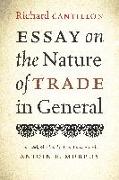- Start
- Essay on the Nature of Trade in General
Essay on the Nature of Trade in General
Angebote / Angebote:
Richard Cantillon (1680?1734), an Irish economist, has claims to be regarded as one of the most outstanding analytical economists of the eighteenth century. F. A. Hayek wrote that Cantillon was the first to fully articulate economics as a science, and Stanley Jevons called Cantillon's only surviving work, Essai sur la nature du commerce en général, the "cradle of political economy." The Liberty Fund edition is a modernized translation of Cantillon's Essai sur la nature du commerce en général (1755) with a new introduction by economics professor Antoin E. Murphy. In the Essay, Cantillon outlined an extraordinary model-building approach showing how the economy could be built up, through progressive stages, from a command, barter, closed economy to a market economy, which uses money and is open. He produced some outstanding monetary theoryincluding what Mark Blaug called the Cantillon effectwhen demonstrating the effects of monetary expansion on inflation, output, and the balance of payments. He also highlighted the difficulties created by excessive financial innovation for a real economy and outlined the dangers of foreign borrowing by a country. Though written in the eighteenth century, the Essay has a considerable resonance for a twenty-first-century audience. Richard Cantillon (1680?1734), an Irish economist, has claims to be regarded as one of the most outstanding analytical economists of the eighteenth century. F. A. Hayek wrote that Cantillon was the first to fully articulate economics as a science, and Stanley Jevons called Cantillon's only surviving work, Essai sur la nature du commerce en général, the "cradle of political economy." The Liberty Fund edition is a modernized translation of Cantillon's Essai sur la nature du commerce en général (1755) with a new introduction by economics professor Antoin E. Murphy. In the Essay, Cantillon outlined an extraordinary model-building approach showing how the economy could be built up, through progressive stages, from a command, barter, closed economy to a market economy, which uses money and is open. He produced some outstanding monetary theoryincluding what Mark Blaug called the Cantillon effectwhen demonstrating the effects of monetary expansion on inflation, output, and the balance of payments. He also highlighted the difficulties created by excessive financial innovation for a real economy and outlined the dangers of foreign borrowing by a country. Though written in the eighteenth century, the Essay has a considerable resonance for a twenty-first-century audience. Richard Cantillon (1680?1734), an Irish economist, has claims to be regarded as one of the most outstanding analytical economists of the eighteenth century. F. A. Hayek wrote that Cantillon was the first to fully articulate economics as a science, and Stanley Jevons called Cantillon's only surviving work, Essai sur la nature du commerce en général, the "cradle of political economy." The Liberty Fund edition is a modernized translation of Cantillon's Essai sur la nature du commerce en général (1755) with a new introduction by economics professor Antoin E. Murphy. In the Essay, Cantillon outlined an extraordinary model-building approach showing how the economy could be built up, through progressive stages, from a command, barter, closed economy to a market economy, which uses money and is open. He produced some outstanding monetary theoryincluding what Mark Blaug called the Cantillon effectwhen demonstrating the effects of monetary expansion on inflation, output, and the balance of payments. He also highlighted the difficulties created by excessive financial innovation for a real economy and outlined the dangers of foreign borrowing by a country. Though written in the eighteenth century, the Essay has a considerable resonance for a twenty-first-century audience.
Folgt in ca. 15 Arbeitstagen
